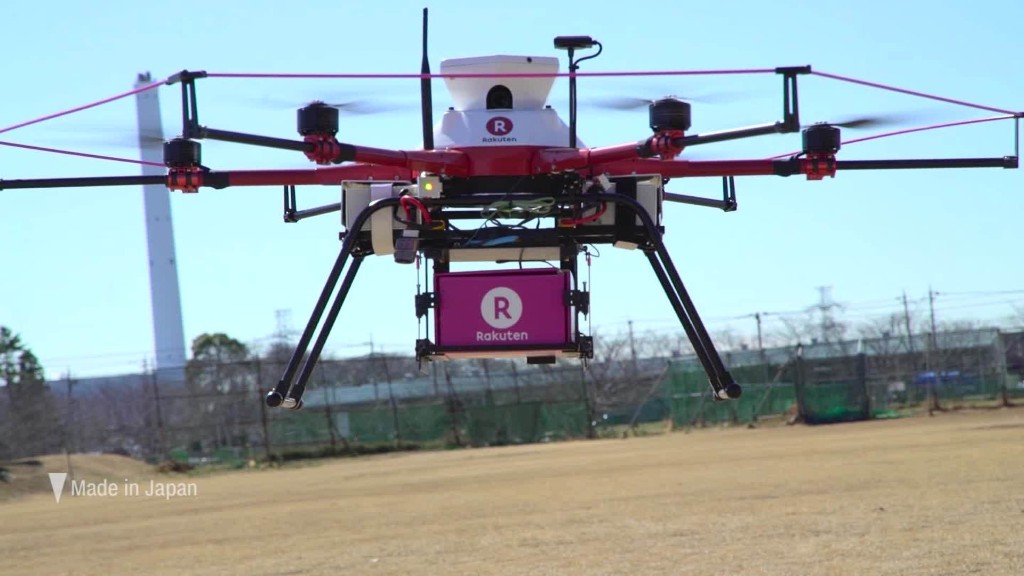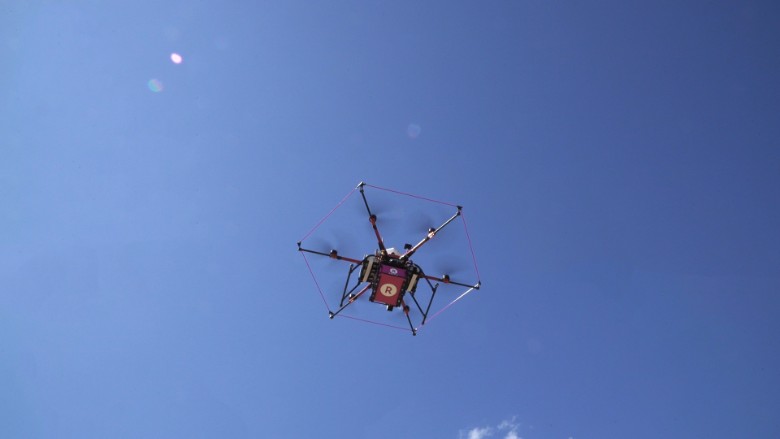

The company kicked off 2017 by celebrating a world record for the longest drone delivery carried out by its research partner Autonomous Control Systems Laboratory. The drone flew a container of hot soup 7.4 miles (12 kilometers) to surfers on a beach.
Rakuten's commercial drones are modeled on the airframe used in that flight.
CEO Hiroshi "Mickey" Mikitani expects drones to revolutionize the delivery sector.
"The capacity in skies above us is far greater than in the roads beneath our feet," he wrote in a recent blog post.
Rakuten (RKUNF) this week teamed up with California-based AirMap to develop technology to manage drone traffic in Japan. They hope to allow drones to operate autonomously at low altitude.
Global rival Amazon is also making an aggressive push into drone deliveries.
Rakuten is tired of being known as Japan's answer to the U.S. online shopping behemoth. With more than 14,000 employees and revenue last year of more than $6.8 billion (781.9 billion yen), it is pushing to become a tech giant on the scale of Google (GOOGL, Tech30) or Alibaba (BABA, Tech30).

Related: How to boost corporate Japan: Stop speaking Japanese
So committed is Mikitani to going global that he made English the official company language back in 2010.
The move shocked corporate Japan, sparking rare public criticism. One fellow CEO called the plan "stupid."
Nearly seven years later, finance chief Yoshihisa Yamada boasts that Rakuten "is very open, dynamic and diverse."
Making English the official language helped the company dispense with the honorifics and deference of Japanese. It also made it easier to hire foreigners, a big advantage given Japan's aging population and shrinking labor pool.
The result is a culture that blends corporate Japanese traditions with a Silicon Valley mindset, said CFO Yamada.
Rakuten takes Japan's "high quality, really customer-oriented service mind" and mixes it "with the Silicon Valley, little bit techie, dynamic culture," he told CNNMoney.
Oh, and that executive who called Mikitani's plan stupid? That was former Honda (HMC) CEO Takanobu Ito. A couple years ago, the automaker announced plans to switch its official language to English by 2020.
Related: There is a retail bubble -- and it's bursting
Rakuten is a household name in Japan, but remains relatively unknown elsewhere.
It spent $900 million buying messaging app Viber in 2014, and has also invested in startups such as Pinterest and Lyft. It's planning a push into connected devices and artificial intelligence.
To boost its global standing, the company inked a multimillion dollar sponsorship deal with FC Barcelona, one of Europe's most successful football teams, late last year.
And it was one of many global tech firms who slammed President Trump's travel ban back in January.
CEO Mikitani, who received his graduate degree from Harvard, posted a series of emotional tweets explaining his opposition to Trump's original executive order on immigration.
"It is wrong as a human being to uniformally [sic] discriminate based on religion and nationality," he continued.
In a blog post, Mikitani pledged to support Rakuten's employees "regardless of their nationality or religion."
Viber offered to provide free international calls from the U.S. to countries affected by the immigration ban.
Trump's order originally barred citizens from Iraq, Syria, Iran, Libya, Somalia, Sudan and Yemen from entering the U.S. for the next 90 days. Mikitani has not commented on Trump's revised executive order, which exempts Iraq from the travel ban.
-- Will Ripley and Melissa Hassett contributed to this report.
CNNMoney (Hong Kong)









 Add Category
Add Category